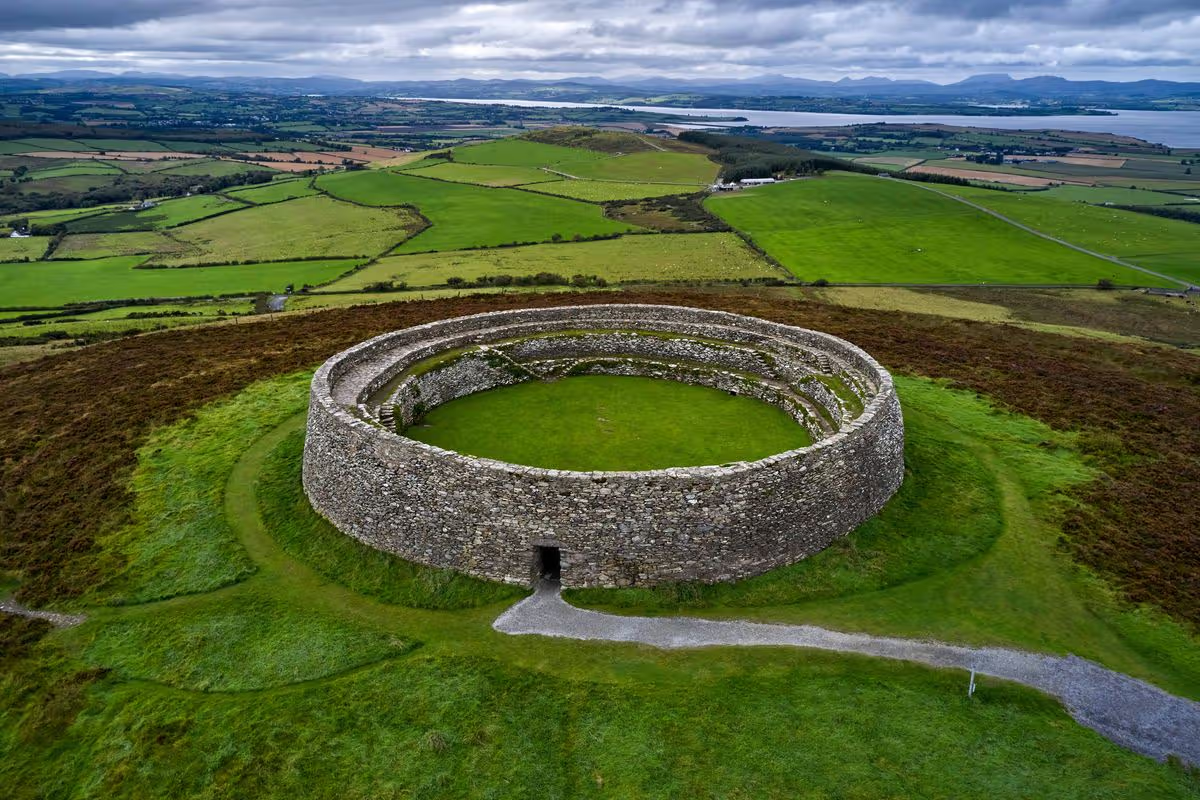The site is an ancient ring fort perched on a hilltop in County Donegal, offering panoramic views and steeped in Irish legends dating back centuries
The Inishowen peninsula isn’t merely the location of Ireland’s most northerly point, but also hosts one of the country’s most captivating monuments, perched atop a hill in Donegal.
The Grianán of Aileach attracts numerous visitors to Ireland, shrouded in mystery as the 6th or 7th century ring fort is steeped in folklore and legend.
Standing majestically on an 800-foot hilltop, the monument historically served as the Royal residence of the Northern Uí Néill, a dynasty descended from a legendary Irish monarch.
Constructed from robust, thick dry-stone walls, it provides breathtaking panoramic views. While much of the structure underwent restoration in 1870, it’s believed to have been initially built during the 6th-7th century, with the earthworks themselves tracing back to 1700 BC.
Legends
Research indicates the fort may have been originally built before AD 800 by an ancient Irish king, Áed Oirdnide, king of Cenél nÉogain. He governed what would have been a modest kingdom situated within the Inishowen peninsula.
From this imposing hilltop, he would have commanded views across his own lands whilst simultaneously surveying the new Donegal territories now under his control. Essentially, the structure functioned as a political declaration and a means to assert additional authority.
Best UK holiday cottage deals

From £27 per night
Sykes Cottages
Sykes Cottages offers a wide range of handpicked holiday homes across the UK and Ireland, from cosy countryside retreats to stunning coastal escapes. Prices start from £27 per night
Another tale traces the fort’s origins back to the era of the Tuatha de Danann, a mythical race said to possess supernatural powers, also referred to as the Fae Folk. The Dagda, one of the revered and divine chieftains of the Tuatha, shares a particular link with this ancient location.
Legend has it that following the death of his son Aodh, the Dagda built a stone fortress to serve as both burial place and memorial. The Metrical Dindshenchas, an ancient Irish manuscript, is thought to explain the site’s name, lending credence to this tale.
The Setting
From the fort, there are sweeping views across both Lough Foyle and Lough Swilly, and locals claim that on particularly clear days, you can glimpse up to five of Ulster’s nine counties.
One impressed guest said: “This ring fort was the most impressive one I’ve ever seen. The views from here highlight why it would have been constructed in this location. They are beautiful. The structure is in very good condition. I stood in the middle and just turned around to appreciate this site.”
Whilst the panoramas from the modest peak are stunning, perched at 250 metres above sea level, there’s virtually nothing surrounding it apart from unspoilt countryside. The only nearby facility is the visitors’ car park, making for a straightforward stroll to the main attraction.
Another visitor said: “This is a beautiful landmark and well worth a visit. Thankfully, the monument is now open, and we were able to go early in the evening. They also have a wishing well that our kids were able to throw money into. Well worth a visit.”
Local attractions
If you fancy a pit stop during or after your journey, the liveliest spot in the vicinity is Londonderry. Located just a 15-minute drive from The Grianán of Aileach, it boasts numerous restaurants, pubs and cafes where you can grab some food.
Alternatively, if you’re enjoying the countryside and prefer somewhere more off the beaten track for refreshments, venture towards Newtown Cunningham. Here you’ll discover several eateries, including Scarpello and Co, Coyles Bar and Restaurant and Kate’s Kitchen.
Should you wish to continue your adventure, just an eight-minute drive from the monument will take you to Inch Wildfowl Reserve along the coast. This stunning location features a magnificent 8 km wilderness walk and hosts an impressive array of wildfowl and geese.

